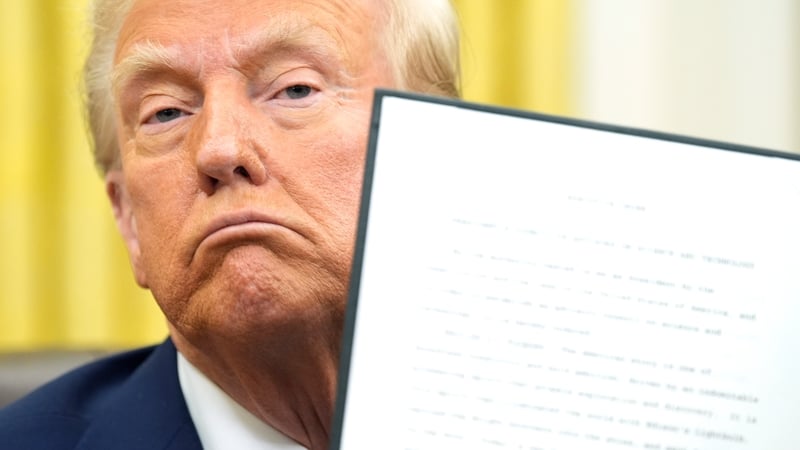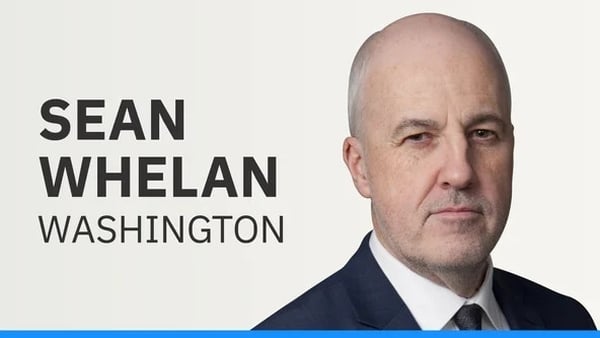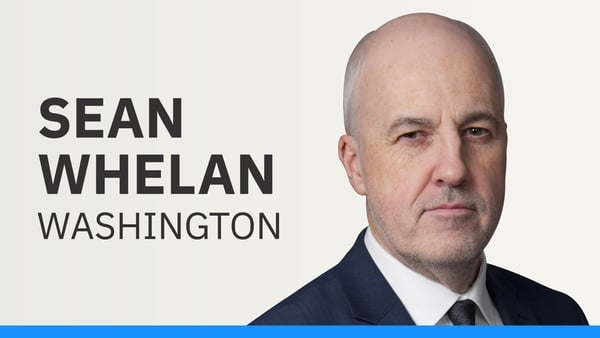You have to draw the line somewhere. And for me the line is the first five days. I mean, how is anyone supposed to keep up with the torrent of news coming out of Trump White House?
"Drinking from a Firehose" was how political nerd and blogger Taegan Goddard described the attempt to both keep up with the newsflow, and separate out the mineral water from the recycled sewage. All we can do is try.
But "flooding the zone" is a tactic of Trump's political management in this term.
A borrowing from American football, it describes efforts to confuse the opposition by overwhelming them with numbers of players, only one of whom will be the intended target of the scoring pass. All DC journalists are cornerbacks now, trying to figure out where the ball is going in a very high tempo game.
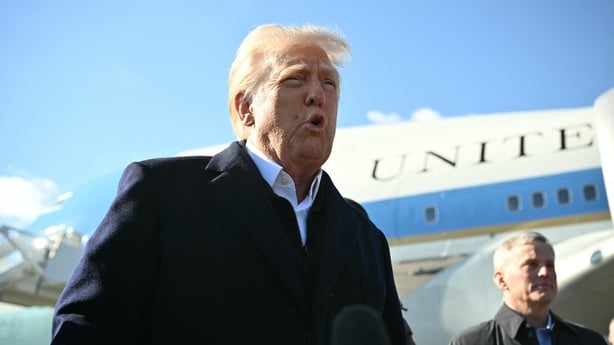
Like any individual player, I can only cover so many options. For me, the more important stuff from the first five days of Trump 2.0 breaks down as follows.
The economy - domestic
"When people were voting last November they weren't thinking about buying Greenland - they were thinking about buying groceries."
One of the few punchy retorts from a Democrat during the first week of Donald Trump's second term came from Paul Begala, the former Bill Clinton election manager, the younger half of a double act with James 'the economy stupid' Carville.
It cuts to a truth about the flurry of announcements and executive orders from the 47th President: None of them are going to bring down the price of goods for ordinary consumers.
Inflation torpedoed Joe Biden and Kamala Harris. As we have remarked before, Harris had nothing to say about the price of stuff for ordinary people, and how to get it down. She failed because she told the truth, that there is not a lot politicians can do about prices - certainly not in the short term. And the short term is how most people live - pay cheque to pay cheque.
Trump had a narrative. It didn't convince many economists - far from it. But at least he had something to say, a story to tell over and over again until people believed in it and invested their hopes in it.
His inflation-busting plan is called "drill baby drill". The theory is if the US pumps more oil and gas (last year was already a record breaker for output in this energy self-sufficient nation), the cost of distribution and transport will come down, freeing up money for Americans to spend on other things. Maybe. But its not going to happen fast. As in the pay cheque to pay cheque timeframe that ordinary people inhabit.
And even if there is a glut of oil and gas production, it may not make a jot of difference to market prices.
On Thursday, Trump told the World Economic Forum in Davos that the data centres needed for US dominance in artificial intelligence will need twice as much energy as the US is already producing. So the AI may drink all the extra oil, demand forcing price up.
So much energy will be needed, Trump said, that data centre operators will have to build their own power plants. And he said they can use any energy source they like. Including nuclear, and what he called "clean coal", that is coal-fired power generating plants equipped with carbon capture and sequestration technologies (which are not widespread or fully proven).
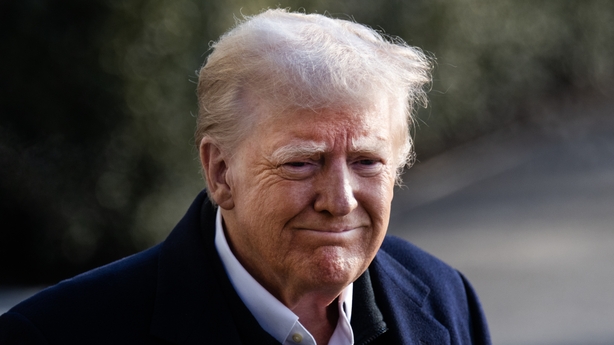
This linkage between domestic energy policy, data centres, AI, and the support he has received from the titans of Silicon Valley - most of whom were sitting behind him at his inauguration in the Capitol on Monday - is well worth keeping an eye on as it plays out.
The economy - international
Oil is also his weapon of choice in international relations, at least this past week. He said he wants Saudi Arabia to bring down the price of oil on the world market through OPEC, pumping more supply to lower prices.
He said this would undermine Russia, which depends on high oil prices to fund the state and its vast expenditure on the war in Ukraine. Low oil prices are always bad for Russia, and now would amount to a huge new sanction on an already frail economy.
Ukraine
Trump taunted Vladimir Putin several times this week, adopting a much harder line than we have seen previously. Not only was there a huge death toll from the Ukraine war, but in pursuing it, Trump said Putin was destroying Russia. He kept suggesting that he negotiate a peace deal, saying Vlodymyr Zelensky is ready for peace.
The diplomatic opening was clear - would Putin go for it?
On Friday evening we had our answer - an interview with Russian TV, hastily arranged by the look of it, in which Putin signalled he was ready to talk, but typically made mischief too, saying "with the current US president I have always had business, exclusively business, but at the same time pragmatic and trustful relations.
"I can't disagree with him that if he was president, if his victory was not stolen in 2020, then maybe there would not be the crisis in Ukraine that arose in 2022."
Not surprisingly Ukrainian President Volodymyr Zelensky said Putin was trying to manipulate the US President to continue the war. But he believes efforts to manipulate Trump will fail.
But its movement of a sort.
Tariffs, trade and tax
Tariffs we were expecting, but disapplying the hard fought OECD corporation tax treaty we were not.
The implications of that move will have to be worked out in the weeks ahead, especially for Ireland, which has raised its main corporation tax rate to 15% to meet the obligations of the treaty to set a floor level of 15% minimum corporate tax rate in the OECD countries.
Trump has spoken of reducing the US corporate tax rate to 15% for companies that manufacture in the US, as part of an effort to drive investment by American companies back into the US after decades of moving production to lower cost countries abroad.
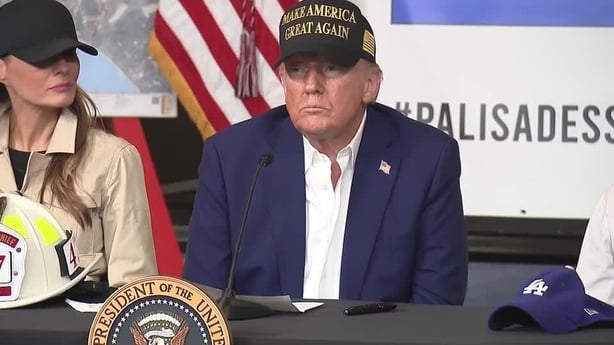
He has specifically targeted the Irish-based pharmaceutical industry, much of which is US owned, and which is a massive part of Ireland’s goods exports to the US.
Again, it was the presence of the bosses of Apple, Microsoft, Google, and Facebook on the dais with Trump at the inauguration that ought to make Irish observers uneasy, as they are four of the top five taxpayers in Ireland (Pfizer is the other one, but drug companies are out of favour in DC these days).
It might amount to nothing, it might be the death sentence for the golden goose, or it might be the re-opening of a hard fought tax deal, a nightmare for finance ministries across the developed world.
As for tariffs, Trump has swung between talking about them as a source of revenue to fund his tax cuts and spending plans at home, and as a big stick, to be wielded to compel other countries to do his bidding on things like immigration, or the supply of Fentanyl and other dangerous drugs (a charge levelled at China and Mexico). They are also seen as a way of forcing a rebalance of some trade arrangements.
Trump also spoke out against the EU twice, stating - quite wrongly - that Europe does not take US cars (a surprise to the millions of Europeans driving Ford, Tesla, Jeep and GM models) nor does it take US agricultural produce (in fact the EU is the US's number four export market, according to the US Department of Agriculture).
Read more: Davos: Fear and exuberance collide as Trump returns
I like cars, so I tend to pay attention when politicians talk about them.
Before Christmas Trump claimed that you can't by a Cadillac Escalade, a huge luxury SUV, in the EU.
During the holidays, I came across a car magazine with all the models available in Germany in 2025 (an astonishing number of Chinese brands and models, by the way). And there it was, the Cadillac Escalade, from €74,000. Dealer listed. More Trump guff.
Its true you don't see too many of them on the roads of Europe; fewer still in the mostly medieval or ancient cities of Europe, where the most massive of massive American SUVs just won't fit.
But the main reason you don't see too many Europeans driving 6.3 litre V8 automatics is petrol at $8 (€7.60) a gallon. Here they moan about petrol prices at $3.20 (€3.05) a gallon. Europeans can "drill baby drill" all the way to Australia, but there is no liquid gold beneath our feet to pump up. We have to make every drop of oil count, squeeze every possible horsepower out of every litre of engine capacity, and look for alternatives.
But cars are only a tiny part of trade between these two economic giants. And the trade in goods is only a part of the story. Yes, Europe does have a big trade surplus in goods with the US. Yes, Trump has suggested we buy US oil and gas to bring that surplus down. The European Commission has been dangling that one as a carrot since 9 November. But will there be enough oil and gas to export? (See above).
And then there is the trade in services. Here, the US has the advantage over Europe. And most of those services are traded digitally - think Microsoft, Google, Facebook, TikTok, the Apple store and its banking service, PayPal (Elon Musk's original big score). But unlike the trade in goods, services are not subject to tariffs (how would you tariff a cat video?).
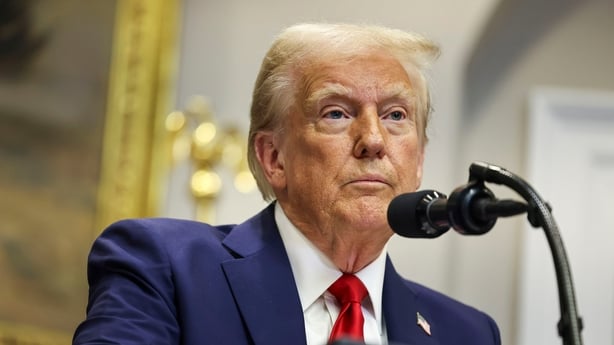
European governments have been trying to capture more revenue from these vastly profitable and massively scaled businesses that have popped up from nowhere and disrupted all western economies, killing off older industries (and revenue streams) along the way.
Proposed digital sales taxes in the UK and France were only headed off by the OECD minimum corporation tax agreement. It looks like another money fight ahead, made all the more difficult by the tax deadline the US is facing at the end of this year, when many of the original Trump tax cuts will expire unless re-legislated.
A failure to do this will result in a big tax increase on ordinary Americans - not the legacy Trump wants to leave behind. But pressure to do something about the US government's chronic borrowing dependency, and its resulting massive national debt and interest bill, leaves the White House hostage to negotiations on Capitol Hill with a group of fiscal hardliners in the House of Representatives, where the Republicans have the slenderest majority in more than a century.
There is a lot going on in the unglamourous world of government tax and spending policy, and it is heading for a crisis point later this year. Without a proper budget since the days of Bill Clinton, the US government finances have become a veritable Gordian knot. Maybe Trump wants to wield a sword to cut through this most tangled of problems. Again, this one needs careful monitoring. but there is so much distraction.
Case in point, Thursday night's televised signing of an executive order to release the remaining documents relating to the assassination of John F Kennedy, his brother Robert F Kennedy, and their contemporary Martin Luther King - three slayings that traumatised America, the former especially spawning a veritable industry in conspiracy theories. It would be nice to find out what the Feds are keeping back, but it may well amount to the proverbial hill of beans.
Trump blamed his former CIA director and Secretary of State Mike Pompeo for holding back some documents on JFK when he signed a similar order in 2017. (The last batch to be released came in 2022 under Joe Biden.).
He then ordered the end of security protection for Pompeo, his former National Security Advisor John Bolton, and the former Covid czar Dr Anthony Fauci. Trump said on Friday they are all rich enough to pay for their own security. Pompeo and Bolton were both under apparent death threat from Iran. Fauci is a hate figure to many on the MAGA/QAnon far right. I saw him with a number of bodyguards at an embassy reception last year - not what you expect for a public health official.
Which is all very interesting, but is not going to really impact on life in Ireland and the rest of Europe in the way the tax/trade/tariff/oil/Ukraine issues will.
Greenland...
....Or that icy wilderness that hardly anyone knows hardly anything about that has suddenly and unexpectedly been catapulted into the middle of European geo-political discussions.
Trump's claim that he was going to buy Greenland was treated as a joke when he first made it (Denmark offered a counterbid for the US on its social media account). Then he said he wouldn't rule out military force. Then he had a phone call with Mette Frederickson, the Danish Prime Minster a few days before the inauguration, and things got noticeably more serious.
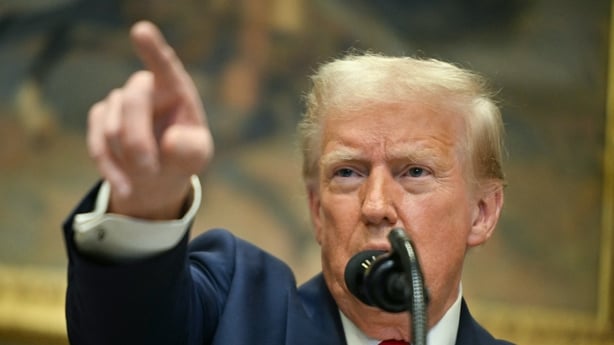
On Friday, the Financial Times offered five anonymous sources, provided by senior and well connected correspondents, all claiming the phone call between Trump and Frederickson had gone very badly.
"Horrendous" one called it, saying Trump had been very firm in asserting that US possession of Greenland was necessary for national security. It's now a very serious matter. The Danish government, according the FT, is in crisis mode (a Danish government spokesman denies the interpretation of the FT).
The pardons
Trump said he was going to pardon most of the 6 January protestors who had been convicted in the courts for taking part in the storming of the US Capitol four years ago. On his first night he pardoned 1,500 of them, including violent offenders, around 300 of them convicted of assaulting police officers - something that senior Republicans, including Vice President JD Vance had suggested wouldn't happen.
As a political tactic it was probably the best option, getting a risky and unpopular decision done at the very start of the presidency, doing it all at once, ripping off the plaster in one go.
Some two thirds of people in instant polls disapproved of the action, but it's likely to run out of steam as a source of outrage in the weeks to come. Those who are against it, will always be against it. Those in favour of it, will back it to the hilt.
A third, fairly large group will go along with it because they want something else from Trump, and are afraid to challenge him. This latter group contains most of the Republicans in Congress, who have been bending themselves into all sorts of shapes to distance themselves from past pronouncements on the 6 January convicts, and fall into line with the orders of the boss.
Those opposed to the mass pardon are some of the police unions who very publicly supported Trump in his election campaign, liking the sound of his law and order policies (including increasing the use of the death penalty).
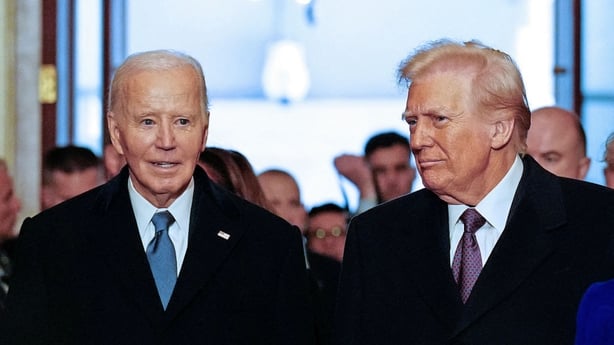
It's not the only questionable pardon this week. Joe Biden, while he sat in the rotunda of the Capitol awaiting the arrival of his successor, waited until the last 20 minutes of his presidency to issue a protective pardon to his brothers and sister and their spouses. He wanted to shield them from any retribution Trump might have been planning (who spoke frequently of the "Biden Crime Family"), but waited until the dying moments of his presidency to bury the bad news amidst the pomp and ceremony of an inauguration and the inevitable deluge of news that Trump 2 would provide.
Yet the Biden pardon stuck in many a craw - probably because of the way it was sneaked out at the last moment, furtive and skulking. Trump's pardon of the 6 January convicts at least had the virtue of having been a campaign pledge. Everybody knew it was coming, right from his opening campaign rally in Waco, Texas. He took the issue to the people, and the people voted for him.
Same on tariffs, deportations, and sealing the southern border - using the army if needed (1,500 troops were deployed by Friday). The overtures to Putin about a Ukraine peace deal, all expected. The new stuff has been Greenland and the Panama Canal.
In his inauguration speech on Monday that invoked the 19th century expansionist doctrine of "Manifest Destiny", Trump repeated his aspiration that the US would take back the canal, which is a key route for world shipping.
But how much of the firehose of announcements in the first five days are aimed at placating the bulk of the Republican electorate, and how many are aimed at a very small number of very rich people in charge of some really crucial industries - the powerhouses of a new US century of power and wealth?
That will take more than five days to figure out.
